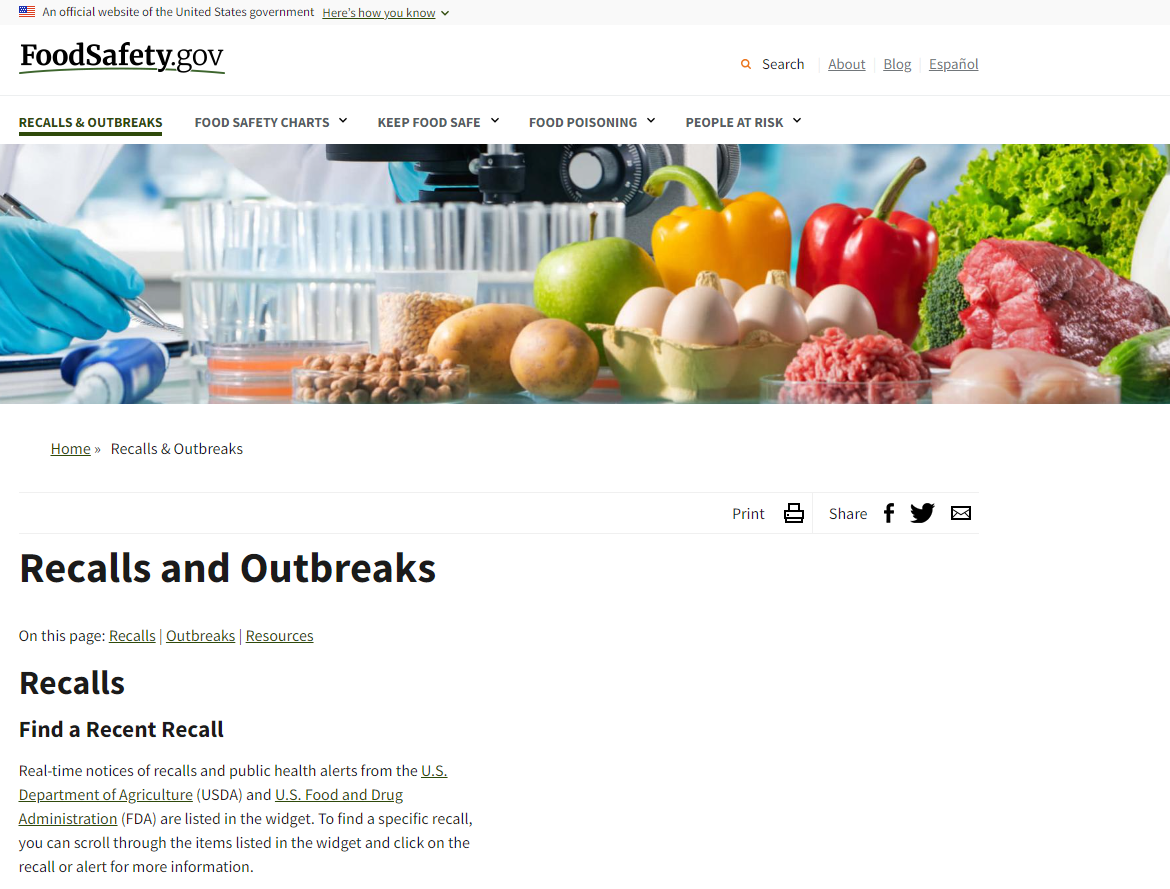FAQs About Food Recalls 
In honor of Food Safety Education Month, let’s take a deep dive into food recalls and frequently asked questions.
If it feels like food recall are on the rise you are correct in that assumption. According to foodsafetynews.com, overall food recalls were up by 8% in 2023 compared to the previous year. The most common reasons for recalls in 2023 were an undeclared allergen (50%), listeria contamination (15%), salmonella contamination (8.6%), and not inspected (6.1%).
- What is a food recall?
A food recall occurs when a product is taken off the market because there is reason to believe that it may cause consumers to become ill. Food recalls may happen for many reasons, including but not limited to:
-
- including bacteria, viruses, or parasites.
- Foreign objects such as broken glass, metal shavings, bones, etc.
- A major allergen that does not appear on the product label. There are 9 major allergens that are required by law to be listed on the label.
- How can I stay informed on food recalls?
Visit www.foodsafety.gov for a complete list and up to date food recall information and safety alerts. You can also find alerts at https://www.fsis.usda.gov/recalls and https://www.fda.gov/safety/recalls-market-withdrawals-safety-alerts.
- Who issues food recalls?
In most cases, the product manufacturer or producer initiates a recall in cooperation with the federal agency of jurisdiction. Government agencies such as the Food and Drug Administration (FDA) or the United States Department of Agriculture Food Safety and Inspection Service (FSIS) may also request or require a food recall.
- How are potentially unsafe food products discovered?
- The manufacturer or distributor may identify the problem and voluntarily inform FSIS or FDA that a potentially unsafe food product has been placed into markets.
- FSIS, the FDA, or a state or local regulatory agency may discover potentially unsafe food products during sample testing one inspections.
- Other federal agencies like the Centers for Disease Control & Prevention (CDC) or Department of Defense (DoD) may report a potential health problem to FSIS or FDA.
- Are some recalls more serious than others?
Yes, recalls are given a class number based on the potential adverse health impacts:
- Class I Recall: Involves a dangerous or defective product that is reasonably likely to cause serious health problems or death. (Ex. raw ground beef found to be contaminated with coli O157:H7). This is the most severe class of recalls.
- Class II Recall: Involves a product that may cause adverse health consequences.
- Class III Recall: Involves a produce that will not cause adverse health consequences but has violated a food safety law or regulation.
- How can I identify if a recalled product is in my home?
Recalls are very specific, meaning all information must match for a product to be considered part of a recall. If a product doesn't match all the information in the recall completely (brand, product name, use or freeze by date, EST number, etc.), then it is not considered part of the recall and is safe to use. Make sure to know your store of purchase and location as some recalls are limited to only certain stores and states. Also check product name, brand, container code, container size, UPC code, best by/use by dates, and any other information provided in the recall statement.
- If I find a recalled product in my home, what do I do?
Do not open or consume the product. You can do one of the following: Option 1) Return the product to the place of purchase for a refund; or Option 2) Dispose of the product following the instructions provided in the recall notice to make sure no one will consume it. Make sure you wash hands with warm water and soap after handling the recalled product.
- If I already cooked and prepared a recalled food item, what do I do?
First, throw out the food. Second, clean your kitchen. Wash all cookware, utensils, counters, refrigerator drawers and shelves with warm soapy water and sanitize. It is important to clean and sanitize as the possible bacteria or contamination may have contaminated the surfaces and cooking equipment in your kitchen.
Chelsea Reinberg, MPH, RDN, Extension Agent; Nutrition, Food Safety and Health, September 2024
Want more great food tips, recipes and nutrition info?
Sign up to receive In Good Health each month in your email inbox.